Emperor Goose Spring Subsistence Harvest Survey
DOI Generic Clearance for the Collection of Qualitative Feedback on Agency Service Delivery
Emperor Goose Subsistence Harvest Data Sheet & Survey Tool
Emperor Goose Spring Subsistence Harvest Survey
OMB: 1090-0011
Emperor Goose Subsistence Harvest Data Sheet
Village: ____________________________________
Date: ______________________________________
How many Emperor Geese did you harvest today? ____________________
Have you harvested any other emperor geese this season (yes/no) ________
If yes, How many? ______________________________________________
Were those geese already surveyed? ________________________________
May we take measurements of your emperor geese? ___________________
Village: |
|||
Goose |
Age |
Sex |
Weight |
1 |
|
|
|
2 |
|
|
|
3 |
|
|
|
4 |
|
|
|
5 |
|
|
|
6 |
|
|
|
7 |
|
|
|
8 |
|
|
|
9 |
|
|
|
0 |
|
|
|
11 |
|
|
|
12 |
|
|
|
13 |
|
|
|
14 |
|
|
|
15 |
|
|
|
16 |
|
|
|
17 |
|
|
|
18 |
|
|
|
19 |
|
|
|
20 |
|
|
|
FAQ’s about data collection of Emperor Geese
Q: Why are you collecting information on emperor geese?
A: Because emperor geese haven’t been harvested in 30 years, we know very little about the interest and harvest level of this species when it finally opens. We will be using the number of geese harvested as a gauge to peoples interest in the future, and make educated management decisions of emperor geese into the future so that the season will hopefully not be closed again.
Q: Why do you want the age and sex of geese?
A: Harvest demographics can tell us a lot of the population. In most species, juveniles are harvested more than adults, but being that we are harvesting them just prior to nesting on their nesting grounds, we are interested in what ratios are being removed from the breeding population.
Q: What does the weight of the bird tell you?
A: The weight of a bird is an indication of how healthy it is. We can get an idea of a birds winter habitat quality and their ability to gain weight just prior to nesting. Heavier birds are more likely to nest, but we know very little about their habitat quality, and what their weight is just prior to nesting.
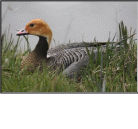 Emperor
Goose
Emperor
Goose
As Our Elders Say, Hunt for the Future

Nacaullek Leghlleq Ligliqpak
Mitilgruaq
A subsistence hunt for emperor geese will open to rural Alaskans living in subsistence eligible areas beginning in spring of 2017 (April 2 through August 31). Emperor goose populations declined significantly in early 1980’s resulting in a closure of any hunting in 1987. Conservation efforts through co-management let the emperor goose population rebound allowing for the first legal hunt in 30 years!
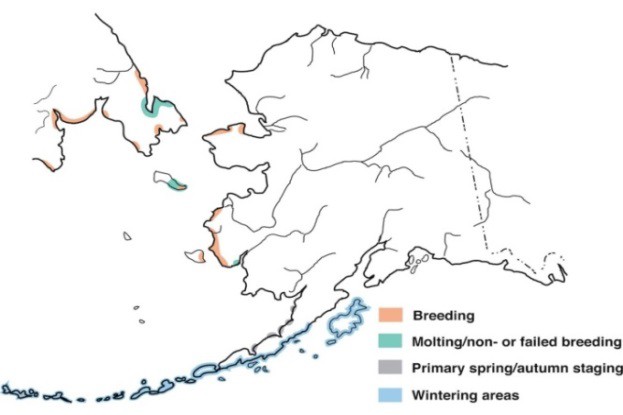 What
Is Special About Emperor Geese?
What
Is Special About Emperor Geese?
The emperor goose is truly “Alaska’s Goose”! Eighty percent of the world’s emperor geese breed along the Yukon-Kuskokwim Delta coast, with the remaining nesting along coastal areas of northwest Alaska and in Siberia. Most emperor geese tough out the winter along the Alaska Peninsula, the Aleutian Islands, and Kodiak Island. They spend the majority of their life in Alaska; some only venturing to Russia to molt.
2017 Spring/Summer Subsistence Harvest
Annual Range of Emperor Geese
Emperor goose populations have grown slowly and have only recently reached the level for customary and traditional hunting to be allowed again under spring/summer subsistence regulations. Emperor geese remain vulnerable to overharvest and the Alaska Migratory Bird Co-Management Council will review population and harvest data annually and implement restrictions if needed. Hunting conservatively will help to ensure future generations have the opportunity to harvest this special bird.
Spring/Summer Harvest Management Plan for Emperor Geese
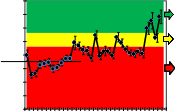 40000
40000
Emperor
Goose
Population
Index
30000
25000
Customary and Traditional Open Harvest
Hunting Restrictions Considere
20000
15000
Closed to Harvest
2017 Fall/Winter Harvest
There will be a fall/winter hunt that allows for the take of emperor geese under a registration permit system administered by the Alaska Department of Fish & Game. More details will be distributed at a future date.
How YOU Can Help Conserve Emperor Goose Populations and Future Hunting Opportunities
Take juvenile birds instead of adults when possible. Harvesting adult emperor geese will have the greatest negative impact on the population as these are the breeders that will be laying eggs and raising young.
Don’t harvest entire family groups, even if you have the chance.
Target single emperor geese instead of flocks to reduce injuries or unintentional mortalities.
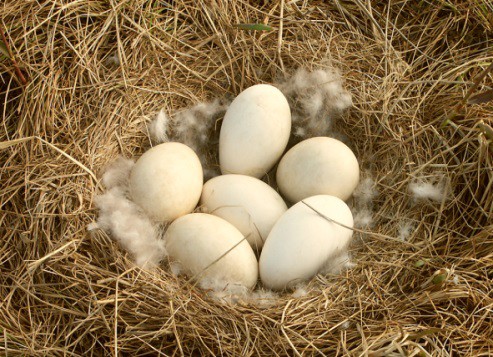
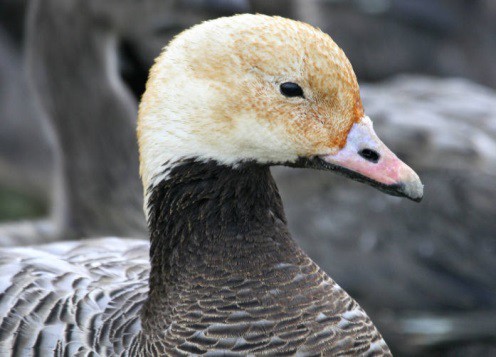


USFWS
T. Bowman/USFWS
Only take an egg or two and leave the rest. Emperor geese don’t re-nest or replace eggs within a season.
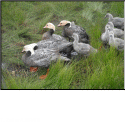
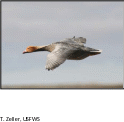

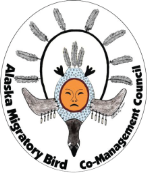 For
More Information
For
More Information
Emperor Goose Management Plans
Pacific Flyway Council: http://pacificflyway.gov/Documents/Eg_plan.pdf
Spring/Summer Subsistence Harvest: Donna Dewhurst, USFWS/AMBCC, (907) 786-3499
Patty Schwalenberg, AMBCC Executive Director, (907) 334-0113
Fall/Winter Harvest:
Jason Schamber, ADF&G, (907) 267-2206
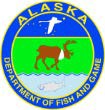
 Schmutz,
J. A., Margaret R. Petersen and R. F. Rockwell. (2011). Emperor
Goose (Chen
canagica),
The
Birds
of
North
America
(P.
G.
Rodewald,
Ed.).
Ithaca:
Cornell Lab of
Ornithology; Retrieved from the Birds of
North
Schmutz,
J. A., Margaret R. Petersen and R. F. Rockwell. (2011). Emperor
Goose (Chen
canagica),
The
Birds
of
North
America
(P.
G.
Rodewald,
Ed.).
Ithaca:
Cornell Lab of
Ornithology; Retrieved from the Birds of
North
America: https://birdsna.org/Species-Account/bna/species/empgoo DOI: 10.2173/bna.97
| File Type | application/vnd.openxmlformats-officedocument.wordprocessingml.document |
| Author | Parrillo, Jeffrey M |
| File Modified | 0000-00-00 |
| File Created | 2021-01-22 |
© 2026 OMB.report | Privacy Policy